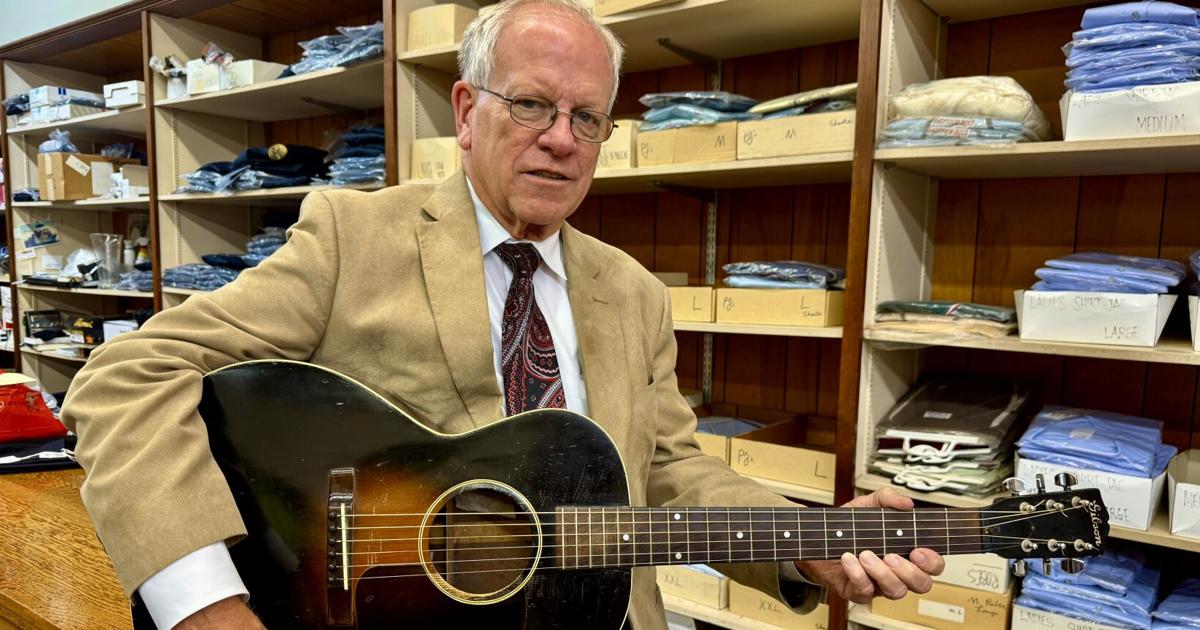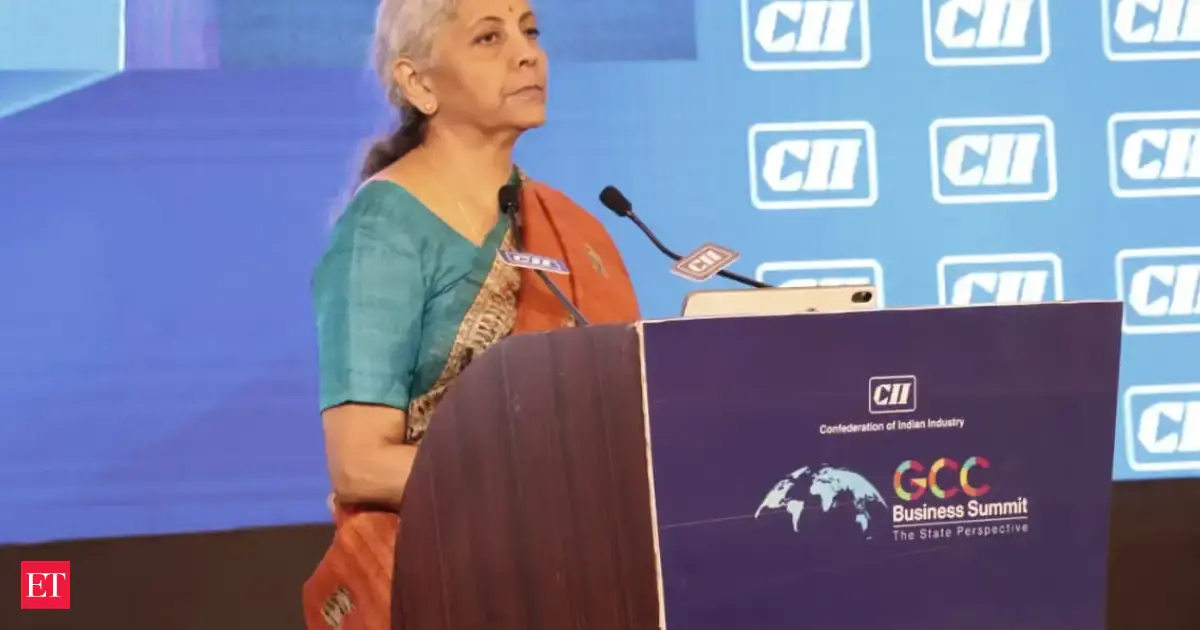
Some afternoons, when things are at their quietest, someone will drift through the front doors and pick up a guitar.
Bradley Bates has plenty of guitars behind the counter in Bates & Thigpen, the men’s store his grandfather opened 100 years ago.
Musically inclined customers usually ask permission to use the instruments, then pick a tune or two.
“There was a guy who came in who was in his 20s,” Bates said. “And he said, ‘I just need a pair of socks.’ I went behind the counter and wrote them up, and he looked over and said, ‘Is that your guitar?’ I said, ‘Yeah, would you like to play it?'”
“Yes sir,” the young man answered, already reaching for the instrument, strumming the strings. He gazed at the guitar in the same awe he would a love interest. And he played the music, as Bates would later learn, that was his birth rite.
The man ripped through one tune, then another. Some notes were anchored in the bluegrass tradition as if channeling Bill Monroe, Lester Flatt or one of the Dillards — the bluegrass family that portrayed the nonverbal, music-playing Darling family on “The Andy Griffith Show.” The family was legendary in the bluegrass world, known for their progressive style.
Bates would soon learn that this young man had a connection to the family. This wasn’t his first rodeo.
In fact, he was set to play at Baton Rouge’s Shaw Center for the Arts that night. Bates doesn’t remember the man’s name, just that he was probably two generations removed from Andy Griffith’s Darlings.
“He was such a nice kid, and I get a lot of people like him, who just go over there and pick up the guitars and sit down for just 30 minutes to pick,” Bates said.
Opened in 1924
Musical interludes probably weren’t Jewel Bates’ intention when he opened Bates & Thigpen in November 1924. He left a job at a downtown department store to team up with W. Thigpen to open the first iteration of his store on Main Street in Baton Rouge.
The idea was to operate a uniform shop.
“It was almost a small department store,” Bradley Bates said of his grandfather’s business. “They sold suitcases up on the racks, and they sold suits and hats, because everybody dressed up to go everywhere back then.”
And Bradley Bates adheres to that tradition, dressing in a tie and coat each day to sell ties and coats.
Jewel Bates operated the Main Street store, while Thigpen acted as a silent partner. Thigpen asked to exit the business, so Jewel Bates bought him out, yet kept his partner’s name on the sign.
The store moved to 350 Third St. in 1965, then to its permanent location at 335 Third St. later that year. The new location offered more space at 5,000 square feet, where a tailoring shop and steam press could be housed in the back. Tailoring is still done onsite on a 1928 Singer sewing machine by Bradley Bates and his son, who goes by Brad, who represents the family’s fourth generation to join the business.
Bradley Bates’ father, Billy Bates, and uncle, Frank Bates, were the second generation to own and operate the store.
Today, Bates & Thigpen stays true to its roots of offering personal service and individual fittings. Suit coats, pants, shirts, shoes, ties and hats are specially chosen from the store’s stock and matched to each customer.
Bradley Bates can look at a customer and immediately determine his size, even in hats.
“Yes, men still buy hats,” he said.
The hats are made of the highest quality material, known as beaver’s wool, which can be resized on an in-store stretcher. If a customer wants his initials inscribed in the hatband, Bates can do that, too.
Top-notch service
The store also still sells uniforms, its contracts including the Sheriff’s Department, Fire Department, Emergency Medical Services companies and the U.S. Post Office. But it’s the personal service that keeps customers going back. This practice was handed down to Bradley Bates by his grandfather, who took customer service a step further during hard times.
Credit cards were nonexistent, and though 1930s prices seem cheap in today’s economy, a $10 pair of shoes was an expensive item.
“Because of the Depression, the store became very conservative,” Bradley Bates said. “And my grandfather sold items to customers on a ‘pay-as-you-go’ basis.”
The store kept a large ledger that Bradley Bates still has today — its brown, tattered pages each dedicated to a customer, along with the record of his payments. The system was still in place at the outbreak of World War II.
“The store was still on Main Street, and a young man was looking through the window,” Bradley Bates said. “And my grandfather walked out and said, ‘Son, you want those shoes?’ The man said, ‘Well, Mr. Bates, there’s a dance coming up at LSU, and I really would like to have them, but I don’t have enough money.”
The shoes were about $10, and the young man had only a few dollars. Jewel Bates led him inside and fitted the shoes. The man reminded him that he was short on funds, to which Jewel Bates replied, “Well, you can give me a little bit now, then you can give me a little bit later.”
“But the young man said, ‘I’m getting ready to go into the military,'” Bradley Bates said. “My grandfather said, ‘Well, that’s fine. You can send me a few dollars from the military, or you can pay me when you get back.’ And he said, ‘Mr. Bates, I might not be coming back.’ Then my grandfather just crossed his arms and said, ‘Then that’s the best I can do for you.'”
A Huey Long story
The man left with the shoes, and years later, Jewel Bates introduced him to his grandson, just as he did former LSU halfback Joseph T. “Rock” Reed on another visit.
But the musicians are different. They come in to make a purchase and stay for the music, the kind of strings Bradley Bates began in childhood, a habit he picked up from his dad. He even has his dad’s old, weathered Gibson guitar in his store collection.
Weathered or not, the Gibson still has the best sound of all the instruments, including the banjo standing among the guitars. And Bradley Bates still plays, even going so far as to attend regular Wednesday evening jam sessions at the Audubon Regional Library in St. Francisville.
He doesn’t claim to be the best player, but it’s something he loves — just as he loves listening to the musicians who occasionally find their way into his store.
Those are the Bates & Thigpen stories that Bradley Bates will add to his grandfather’s, then pass them down to the fifth generation — his grandchildren Luke, Elaina, Remy and Riley.



